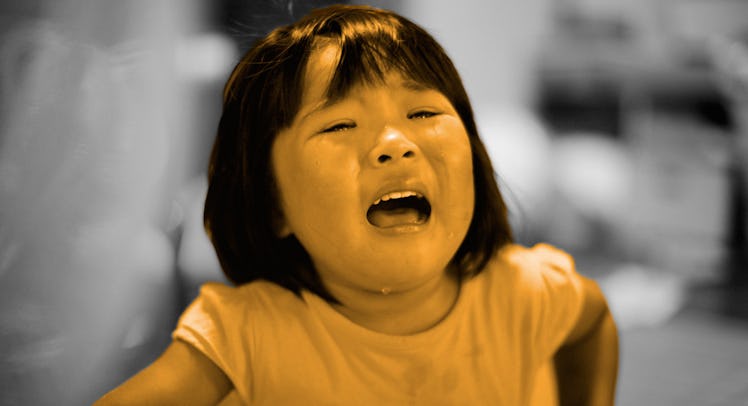How to Discipline Your Toddler
First, take a deep breath.

He throws a plate. She hits her sister. He eats three more cookies than he was supposed to. She ran away from you in the middle of the mall — and proceeded to have a public meltdown. All of these scenarios are familiar to parents with toddlers. And though they vary by degree of seriousness, they deserve some form of discipline. After all, each are wrong and shouldn’t be repeated in the near future. But how does one discipline a toddler in a way they can understand?
First of all, respect the complexity of your young one. “We think of toddlers as children who walk unsteadily,” says Amy McCready, author of If I Have to Tell You One More Time, “but they also show plenty of instability in the social and emotional realms. They’re not only navigating the world around them, but also finding their place in the family constellation and gaining a sense of independence.” Toddlers are just beginning to explore the world around them, test their boundaries, and find out how their parents tick.
ALSO: How to Discipline a Child with ADHD
As such, toddlers are impulsive by this developmental stage and not entirely in control of their actions. “They are not able to understand another’s point of view or to have consideration for another,” says Bonnie Harris, founder of Connective Parenting. “When they have a tantrum, it’s because their coping skills have maxed out and they are flooded with frightening emotions.”
So right off the bat, toddlers require a lot of sympathy. If a parent wants to break through, they need to understand why their kid did something, and then realize the response is outsized by nature “Toddlers are emotional little beings, and it’s worse when they have trouble understanding the world around them, or have trouble being understood,” says McCready. “When your toddler experiences big emotions, keep in mind that they’re probably scared by these emotions and don’t know how to calm down by themselves.”
Given this, yelling at your toddler will truly only make things worse. “When toddlers hear yelling, they get scared, upset and defensive — not exactly a good frame of mind for learning anything,” says McCready. Yelling can also break the connections between parents and children and leave a toddler confused and alone. “Depending on their temperament, they either takes it in in shame and self-defeat, or fight back to preserve integrity.”
MORE: The Biggest Lies Parents Tell Themselves About Discipline
Sorry parents, but your best move is to suck it up and stay calm. By remaining calm, you model the behavior that you want to see in your kid, which will become important especially if you are doling out any sort of discipline. At a toddler’s developmental stage, modeling good behavior can be the difference between a problem child and an angel. Then, “with a calm voice, maintain a strong connection while redirecting the child or helping him remedy the situation.” says McCready
For example, if your kid throws cereal in the breakfast aisle onto the floor, show them how to act in a grocery store — calmly put the box back, and calmly explain why we don’t do that. If they leave a mess, show them what it’s like to clean up. “Whenever you see positive behavior, encourage it,” says McCready. “Toddlers really want to do the right thing, and they’ll keep it up when we notice in a positive way.”
Another option is to give your toddler a test. “Ask the child if he can think of another way to get what he wants,” says Harris. “Or give him two choices. It both acknowledges the child and holds him responsible for thinking through the situation and coming up with a different choice.”
“We might say, ‘It’s not okay to throw sand in the sandbox. If you throw sand, we will be done with the sandbox for the rest of the day,” says McCready. “So, to make sure you understand, what happens if you throw sand?’” This leaves it up to your kid to choose to make the right choices.
Toddlers are frustrating, emotional, agile little creatures. So stay positive, focus on learning, and leave the yelling and screaming to them.
Read more of Fatherly’s stories on discipline, behavior, and parenting.
This article was originally published on